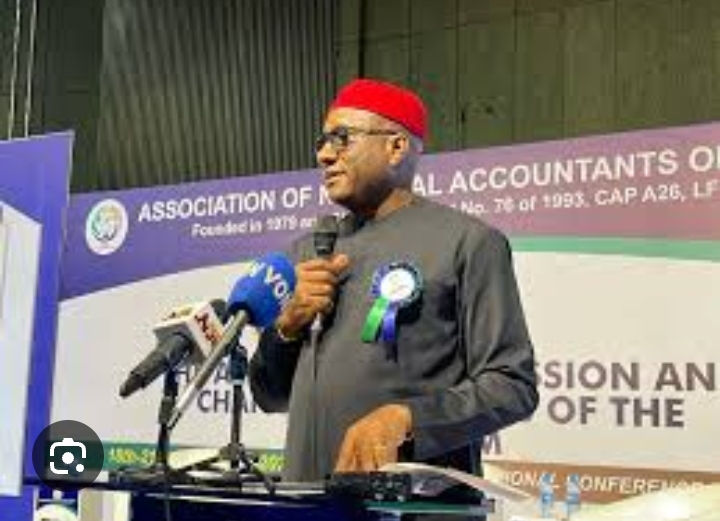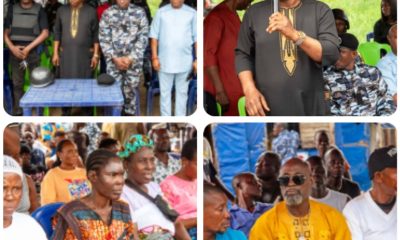Editorial
THE UNFLAPPABLE WINGS OF ALLEN ONYEMA: THE AIR-KING OF AFRICA.

By Tobouke JEMINE
What lessons are there to learn from the success story of the King of Air Peace, Barrister Allen Onyema?The success story of this great Nigerian is based on certain principles of success he put into use, knowingly or unknowingly. And those rules, values and virtues that gave birth to the greatness of this man are not buried in the mouth of the needle. In his story, we shall find them.
He was born in March 1964 in the historic city of Benin, Nigeria. He came as the first of nine children born to Michael and Helen Onyema. He came from a humble background in Mbosi town in Ihiala Local Government Area of Anambra State. He studied Law at the University of Ibadan. He excelled in business, made his first millions at 25 and got married at 26 to Alice, an Igala woman from Kogi State. A father of proud children and a philanthropist to the core.
In the course of a conversation with Dr Ubong King on Dr King’s”Break the Rules” program, the Air Peace King said, “Don’t look down on anybody; God could use anybody to uplift you”. The practice of these words put the Air Peace King on the path of unimagined and unlimited success. Yes, the godly attitude of not looking down on the person next to you could go a long way in transforming your story overnight.
While he was nursing hope for a better future in Oshodi, Lagos State, he had some ‘garage boys’ who were his friends. One of them happened to belong to a family that had a large expanse of land that they wanted to sell. He helped this family to bring some buyers. And weeks later, the family called him and told him he should help them sell 400 plots of their land. He agreed.
A plot of the land was to be sold for #5,000. This was 1990. And the agreement was that whatever figure he added on top the said amount was his commission. He sold some plots, and used the money to pay for adverts in the then popular Concord Newspaper owned by MKO Abiola, and this marketing strategy boosted finances beyond his imagination.
In the process, he was wisely counselled to buy some of the property. And he wisely took the advice and bought 87 plots out of that family property. He stepped up his game by floating a real estate company called Allen Onyema & Company. In 1992, he resigned from his place of work in order to avoid conflict of interests and put in his best to his growing business empire.
Think big even while you are growing small. Allen floated a Law firm; established continental and intercontinental business links; got into business desls with Korean business entities; Imported electronics, and as he continued to provided solutions to the commercial needs of his environment, his financial pockets got deeper — just as he said, “If you become the first person to provide answer to a problem, you are on your way to becoming wealthy.”
But in 2003, his businesses suffered setbacks.He prayed to God and vowed to make a difference in the lives of people and community if God helped him to cross that rough sea. His petitions were answered. The sea returned to glassy calm. The fields became fruitful again, pointing us to the fact that, there is a divine factor in the success story of every man. This Truth stands even if that success does not recognize and appreciate it.
Why Air Peace? In 2007 , Allen looked and saw that his businesses were making billions for him, but felt lives were not being touched. Hence, he began to ponder on what to do to change empower lives. He saw that even those he empowered financially were coming off worse. He was counselled to go into aviation business, where he was told an airplane could employ, at least, one thousand people. Following that advice, he bought 3 airplanes, each from France, Germany and the US in 2013.
While celebrating this feat in London,he got to discover that the airplanes he bought could not fulfill his dream of employing three thousand people. They were executive jets for charter, and needed only a few “Beautiful girls” and some good pilots to run them. He was disappointed and angry. But when he was told that Boeing airplanes could do the dream, he flew to Texas,America to buy four Boeing airplanes.Then the unexpected happened. For almost almost two years, the Eagle of the Sky was denied license. But through persistence and dedication, he he flapped his wings and soared above the storms, and he has since being UNSTOPPABLE AND UNFLAPPABLE in the air.
Aside providing jobs for thousands of Nigerians, Africans and beyond the continent of Africa, the unshakable King of Air Peace has been very much involved in providing scholarships to the underprivileged, supporting communities with social amenities, promoting and advocating for a society free of conflicts and disharmony.
In 2019, Chief Allen evacuated hundreds of Nigerians who suffered Xenophobic attacks from black South Africans. For this cause, the House of Representatives invited him to address the House and recommended him for National Honours, which President Buhari did confered on him. And in the heat of COVID-19 lockdown, the Eagle of Air Peace also evacuated many Nigerians from Thailand , Malaysia, India and other parts of the world who were financially incapacitated to pay for tickets to return to their roots in Nigeria.
The Man is a legend in the making.
Editorial
Is Dubai A Country? Inside the Seven Kingdoms of the United Arab Emirates

By: Editorial Team
The United Arab Emirates (UAE), often hailed as a beacon of modern development in the Middle East, is a federation of seven emirates—each with its own distinct history, ruler, and cultural identity. Since its unification in 1971, the UAE has stood as a rare example of how traditional monarchies can collaborate to build a stable and globally respected nation.
At the heart of the federation lies Abu Dhabi, the capital and largest emirate, known for its vast oil wealth and political influence. The Al Nahyan family, which leads Abu Dhabi, has played a central role in shaping the UAE’s national vision and foreign policy. The current President of the UAE traditionally comes from this emirate, underscoring its leadership within the union.
Dubai, the shining star of the federation, represents ambition and innovation. Under the leadership of the Al Maktoum family, Dubai has transformed from a desert outpost into a global hub for finance, tourism, and technology. Its breathtaking skyline, led by the Burj Khalifa, has become a symbol of Arab progress and resilience.
Moving beyond the two powerhouses, Sharjah distinguishes itself as the cultural and educational capital of the UAE. Led by the Al Qasimi family, it has preserved the emirates’ artistic heritage while promoting academic excellence through its numerous universities and museums.
The smaller emirates-Ajman, Umm Al-Quwain, Ras Al Khaimah, and Fujairah-each add unique character and strength to the federation. Ajman, the smallest, thrives on trade and manufacturing; Umm Al-Quwain offers a peaceful charm along its quiet shores; Ras Al Khaimah, nestled against the Hajar Mountains, is known for its natural beauty and growing industrial base; and Fujairah, facing the Gulf of Oman, plays a strategic maritime role in the region’s economy.
Despite their differences in size and resources, the seven emirates remain bound by shared values, mutual respect, and visionary leadership.Their collective success story reflects not only unity but also the ability to balance tradition with progress.
Over five decades after its founding, the UAE continues to prove that cooperation among monarchies can yield a modern, forward-looking state-one that honors its past while boldly stepping into the future. The federation’s model of governance offers an enduring lesson in leadership, stability, and nation-building in a region often defined by division.
Photo Credit: shuterstock
Editorial
The Modern Avatar of Agadagba

Editorial – IduwiniVoice
Government Oweizide Ekemupolo is 4th Century descendant of The progenitors of the Oru tribe, the archetypal Ijaws, who settled in the central Niger Delta and over time, who developed and spread to the entire Niger Delta. He his an embodiment of the ancient and modern ways and forces of the ijaw ancestral greats, ruled my ancient spiritual and human laws, a man and a superman.
Prior to 1600 AD, the Ijaws first and formally formed city-states on their island of abode in Central Niger Delta. The city-states were named Agadagba-bou, Isomou-bou, and Opugla-bou. The popular city-state was called Agadagba-bou, which, according to history, flourished for 400 years until it got abandoned in 1050 CE. That was the period Ijaw people migrated within the central Niger Delta and spread to the Western and Eastern Niger Delta.
Agadagba-bou, Isomou-bou, and Upugla-bou, which represented the Ijaw civilization at the historical island, long before it was named Wilberforce Island, had cultural, spiritual, linguistic, and occupational homogeneity.
They were all worshippers and believers of the sky God. The sky God that the Ijaws call today, even from ancient times, is Egbesu. It is believed that the Wilberforce Island was known as a forest named after Agadagba, the most powerful chief priest of Egbesu, who also doubled as the military general of the Izon nation.
Agadagba-bou, as a nomenclature, derives its bearing from Agadagba, the chief priest and generalissimo who once reigned on the Wilberforce Island. It is certain that the island hosted the Ijaw nation long before the time of Agadagba because Agadagba was appointed a chief priest and military general during his time by a potentate ruler of Ijaw nation.
In the primordial mists of time, Agadagba, the illustrious military general and chief priest of Egbesu, strode forth from the hallowed grounds of Agadagbabou, his footsteps echoing through the annals of Ijaw history. This revered figure, a paragon of martial prowess and spiritual wisdom, embodied the dual essence of his people, wielding the sword and the sacred staff with equal aplomb. The whispers of the ancients tell us that Agadagba’s reign predated the 1600 AD, a bygone era when the Ijaw nation thrived in harmony with the rhythms of the Niger Delta.
Agadagbabou, the cradle of Ijaw civilization, slumbers beneath the weight of centuries, its sacred soil serving as the final resting place of the ancestral spirits. Here, the venerable dead lie entombed, their ethereal essences lingering, awaiting the supplications of their descendants. Alas, the diaspora of the Ijaw people has occasioned a lamentable disconnection from these archetypal forebears, a severance that has hindered the unfettered flow of ancestral blessings, those numinous benedictions that are the birthright of every society.
For it is an immutable truth that the progress of a people is inextricably linked to the approbation of their ancestors.
The epochs have passed, and Agadagba’s terrestrial sojourn has long since drawn to a close, yet the imperishable essence of this legendary figure endures, awaiting reification in the mortal coil. Behold, 4.18 CENTURIES AFTER AGADAGBA, PRICESELY FOUR CENTURIES PLUS, in this our age, Government Oweizide Ekemupolo, a worthy scion of the Ijaw nation, has arisen, invested with the sacred mantle of Egbesu’s chief priest and military general. The symmetries are striking, the correspondences unmistakable: Ekpemupolo stands forth as the avatar of Agadagba, a reincarnation of the primordial hero, reborn to reclaim the lost patrimony of his people.
As we gaze upon Ekpemupolo, we behold the rekindled flame of Agadagba’s indomitable spirit, a fiery essence that refuses to be extinguished. The mythopoeic imagination whispers secrets in our ear, intimating that this modern-day embodiment of Ijaw valour and spirituality is, in truth, a Priest of the ancient mysteries, a hieratic vessel ordained to restore the pristine glory of Agadagbabou and reestablish the vital link between the living and the ancestral dead.
Thus, the epicycle of time turns full circle, as the reincarnated Agadagba, in the person of Ekpemupolo, strides forth to reclaim his rightful place within the sacred precincts of Ijaw tradition. The word is a witness to his spiritual and endeavours which catalyse a renaissance of the Ijaw spirit, rekindling the ancestral fires that burn bright within the collective unconscious of this venerable people, and guiding them toward a future illuminated by the radiant glow of their archetypal forebears.
As Tompolo’s efforts continue to bear fruit, Nigeria’s economic landscape is transformed, and the nation’s people reap the benefits of his tireless endeavours. His legacy will forever be etched in the annals of Nigerian history, a shining testament to the power of visionary leadership and unwavering dedication to the nation’s progress.
Benedict Binebai is a Professor of African Literature, a Social Conscientizer, and a Critic of outstanding repute.
(c) IduwiniVoice
Editorial
A Magnificent Gesture of Philanthropy: Tompolo’s Landmark Donation 10 Billion Naira to Delta State Government

Editorial
Chief Tompolo’s most generous bestowal of 10 billion naira upon the Delta State Security Fund is a magnificent affirmation of his steadfast devotion to the betterment of his beloved homeland. This munificent act not only underscores his profound solicitude for the well-being of the citizenry, but also serves as a sonorous confirmation of his dedication to the edification of the nation.
This magnificent donation bespeaks Chief Tompolo’s perspicacious vision for a Delta State wherein the territorial integrity, individual safety, and proprietary rights of its inhabitants are zealously safeguarded and protected. For it is an immutable truth that security constitutes a fundamental pillar for peaceful and progressive human existence, and a people that get security right are a people who enjoy prosperity, stability, and tranquillity. His largesse constitutes a clarion call to all right-thinking Nigerians to emulate his exemplary conduct, thereby contributing to the realisation of a more stable and prosperous nation.
As a private individual, Chief Tompolo’s remarkable munificence distinguishes him as a true architect of society, a philanthropist of discerning taste, and a stalwart champion of both private and public institutions. His actions evince a profound comprehension of the intricate nexus between security, patriotism, and nation-building, and serve as a shining exemplar for others to follow.
In the pantheon of benevolent figures, Chief Tompolo’s deed resonates with the selfless generosity of mythical beings like Prometheus, who defied the gods to bestow the gift of fire upon humanity, or Hercules, who cleansed the Augean stables to bring prosperity to the land. Like these fabled heroes, Chief Tompolo’s philanthropy emanates a profound sense of altruism, illuminating the path towards a brighter future for the people of Delta State.
By this singular act, Chief Tompolo has floated a most compelling narrative that the Ijaw nation, and indeed all ethnic groups in Nigeria, have a critical role to play in shaping the country’s destiny. His donation is a puissant statement that the resources and talents of Nigerians, regardless of their region or ethnicity, can be harnessed to forge a more united, secure, and prosperous nation, and that the Ijaw people, in particular, are committed to contributing to the construction of a brighter Nigerian picture.
Chief Tompolo’s unprecedented gesture inaugurates a new paradigm of leadership for the Ijaw nation, one that radiates an unparalleled aura of generosity, vision, and selflessness. This luminous exemplar of leadership kindles a guiding light, illuminating a path towards a more prosperous, equitable, and enlightened future for the Ijaw people, and serves as a resplendent model for leaders across Nigeria and beyond, demonstrating that true greatness is measured by the ability to uplift and empower one’s community.
Benedict Binebai is a Professor of African Literature, Public Speaker, and a renowned critic of intellectual acclaim.
(c) IduwiniVoice


